Let's discuss Putin speech. He declared Ukrainians to be "Neonazis" and promised to "denazify" them. Indeed the "Nazi" character of Ukrainian statehood and identity has long been a central thesis of Russian propaganda. Let's discuss why and how it reflects ideology of Putinism🧵 
Why do we exist? Different Russian regimes gave different answers to this question. Bolshevik theocracy claimed to lead humanity to the earthly heaven of communism. Until 1960s they were serious about it. In 1960 Khruchev gave specific deadline: communism will be built by 1980 
Khruchev however was the last true believer at power. In 1964 he was deposed by Brezhnev who didn't care. Brezhnev abandoned the agenda of building communism by a specific deadline. "Developed socialism" would be good enough. So we kinda don't march to the earthly heaven anymore 
That however created a problem of justification and legitimacy. If we aren't unironically building Communism, then why do we exist? What's our source of legitimacy? Brezhnev told: because we won the WWII. We saved humanity from the Nazism which is our greatest accomplishment ever 
Brezhnev transferred the source of state legitimacy from the future to the past, changing the entire narrative. Previously sacrifices of Stalinism were justified as the path to Communism. But now we aren't really going anywhere. So now the sacrifice was necessary to win the War 
As a result, Brezhnev started to massively build the cult of Great Victory. Immediately upon taking power, Brezhnev introduces Victory Marches on the Red Square every 9th of May - the date of the fall of Berlin. He makes it a ritual of the new state religion, justifying his rule 
The Cult of Victory was made up to fill the hole left by the abandonment of Communism-building. If we can't say we are marching to the bright future (nobody believes), then we'll discuss our great accomplishments in the past. Brezhnev awarded himself with all kinds of WWII medals 
The USSR became Russia, and the history repeated itself. In the 1990s Kremlin was claiming we are building the bright future and gonna become rich and developed like the West. By 2000 nobody believed in that future. So Putin again transferred the source of legitimacy to the past 
As a result new, highly idiosyncratic ideology of Putinism emerged. It combined the respect to Stalinism (which achieved the Great Victory), the Russian Orthodox clericalism, the Russian ethnonationalism. It's often mocked as Russian Orthodox National-Communist Monarchism 
Again, this led to a retrospective change in the narrative. Stalin became good cuz he restored the Russian Empire and won the war. But Stalin didn't want to restore the Russian empire, he was building Communism. And he didn't intend to wage this war, at least not like that 
To start with, Stalin regarded *Germany* as his natural ally against the Versailles victors - UK and France. So he needed to pump Germany up, make it it stronger. Long before the rise of Hitler, Stalin had been building the German military might, which would then strike on Allies 
After WWI Germany couldn't organise proper training for its military. So Stalin invited German officers to the USSR schools to get experience with high-tech armaments. For example Guderian, the future architect of German Blitzkrieg, learnt how to use tanks in Kazan Tank Academy 
Consider a talk between Molotov and Kurt von Schleicher, a conservative Chancellor of Germany, in 1932. Schleicher complained about subversions by German Communists. Molotov responded:
- USSR won't mind if Germany treats their Communists as USSR is treating enemies of the people
- USSR won't mind if Germany treats their Communists as USSR is treating enemies of the people
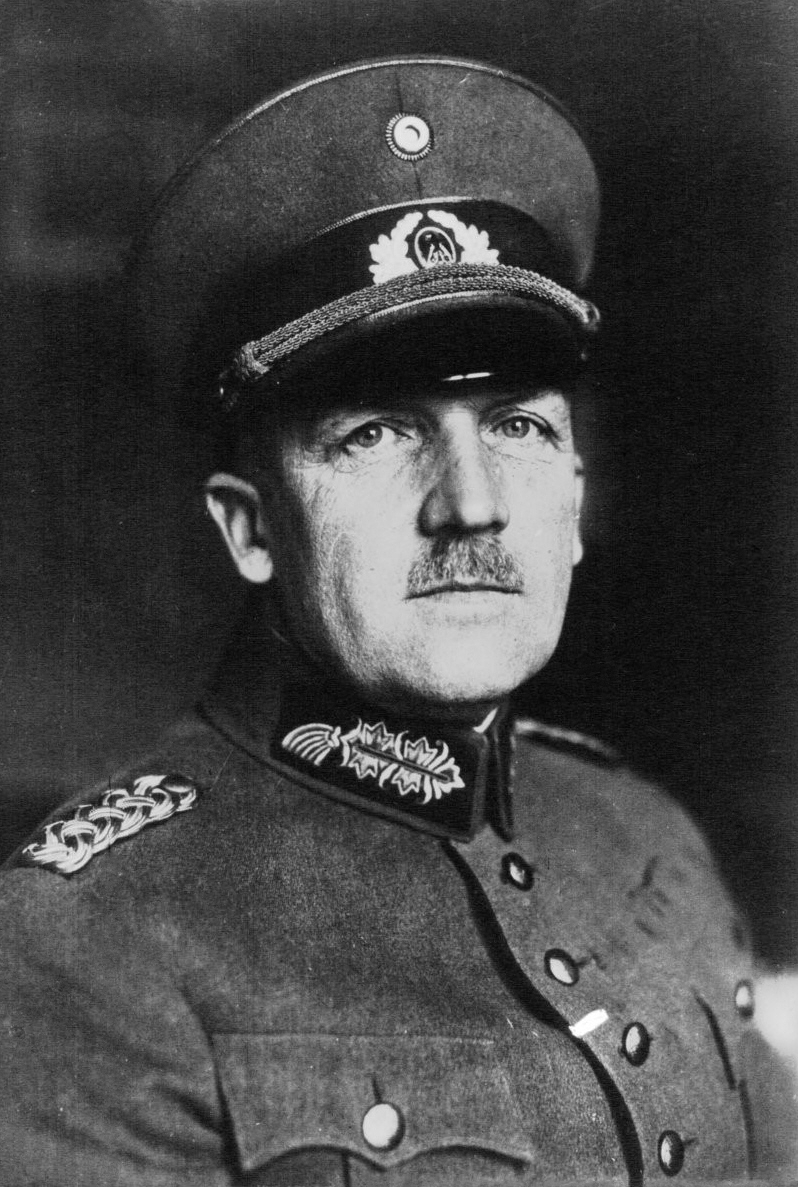
Molotov-Ribbentrop pact wasn't an aberration. It was a geopolitical decision independent from who's in power in Berlin. Stalin was building German military power to unleash it on the Allies. He was totally ok with sacrificing German Communists, whether to Schleicher or to Hitler 

So all the talks about this pact "delaying the war" are BS. Stalin didn't want to "delay the war". He wanted to accelerate it and to use Germany as his instrument for destroying the Versailles order. In 1939 Soviet and German forces crashed Poland together and paraded in Brest 
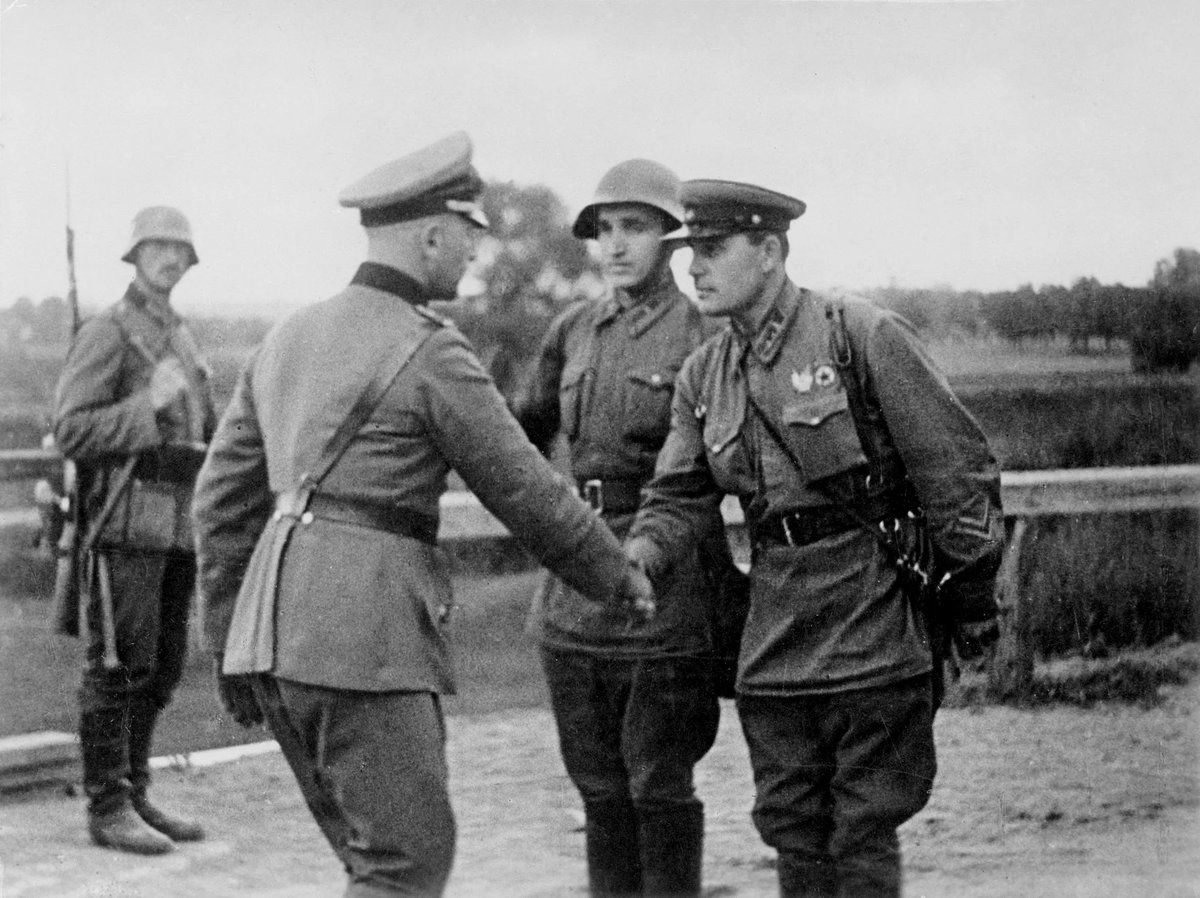
Consider a caricature from the Soviet satyrical journal Krokodil:
- At this point we finish studying the history of the Polish state, children
In 1939 Soviet propaganda considered the WWII to be very good and very funny thing. Everything was going as planned
- At this point we finish studying the history of the Polish state, children
In 1939 Soviet propaganda considered the WWII to be very good and very funny thing. Everything was going as planned
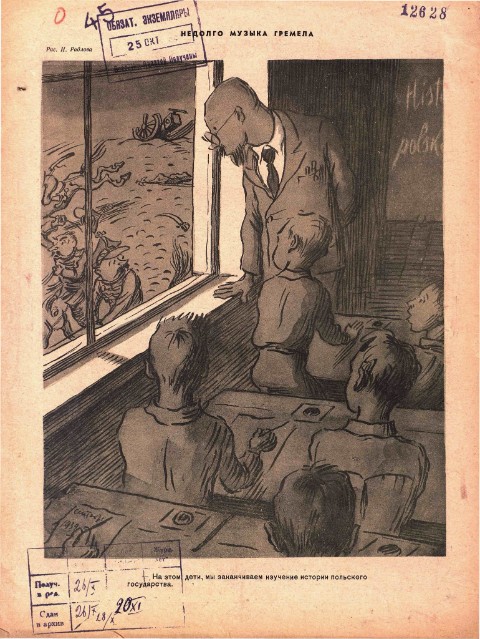
That's a caricature from the New Year Eve 1940-1941 on the German bombings of London:
- Gentlemen! Where's the nearest bomb shelter?
Once again, Soviet propaganda cheered the Nazis carpet bombings London. That was the Stalin's plan and everything was going according to the plan
- Gentlemen! Where's the nearest bomb shelter?
Once again, Soviet propaganda cheered the Nazis carpet bombings London. That was the Stalin's plan and everything was going according to the plan
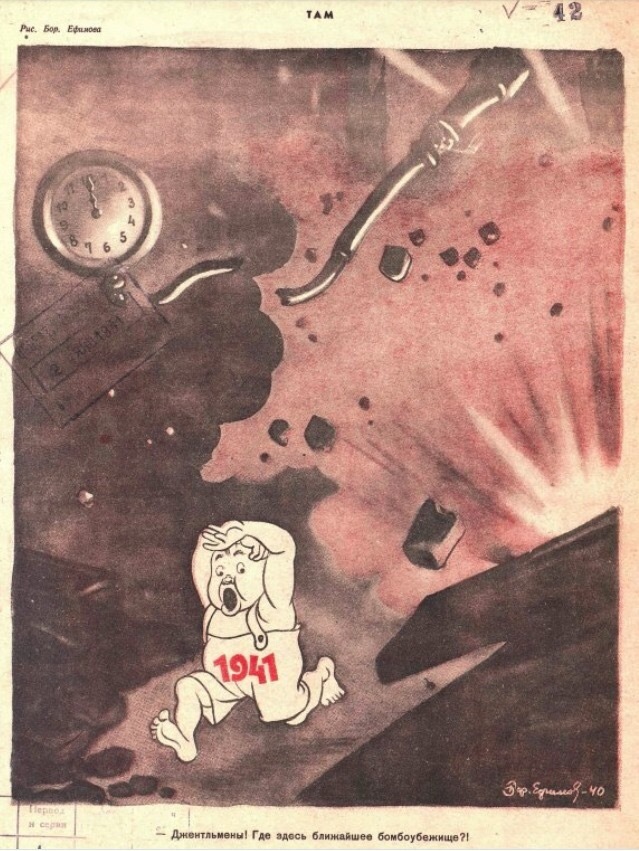
What was Stalin hoping for? Most probably he miscalculated. Most probably he was planning for a long indecisive war between Germany against France and Britain like in WWI. Western Europe would be largely destroyed and then victorious Stalin would come and fuck everyone 
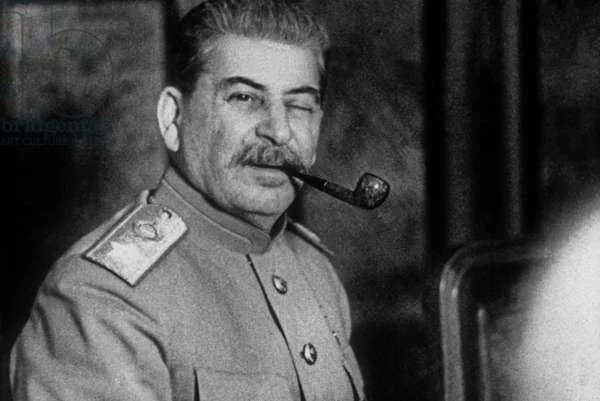
Soviet poetry (=published state propaganda) translated exactly this agenda. Consider Kulchitsky's poem from 1941:
- Secret trains are already going to the borders. And the Communism is just as near as in 1919...
Translation: We created chaos and gonna use it to win and conquer
- Secret trains are already going to the borders. And the Communism is just as near as in 1919...
Translation: We created chaos and gonna use it to win and conquer
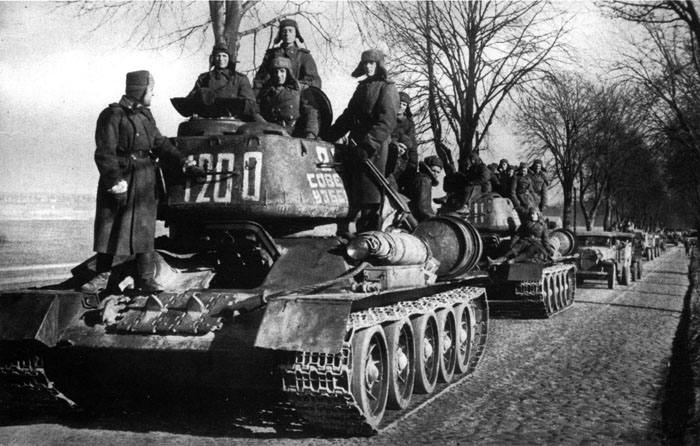
But Soviet-trained German military crushed the Allies in no time. While the Soviet military who taught them were slaughtered during the Great Purge 1937-1938, like the main advocate of tanks Tukhachevsky. 3/5 marshals, 58/62 corpse commanders executed. Soviet army was destroyed 
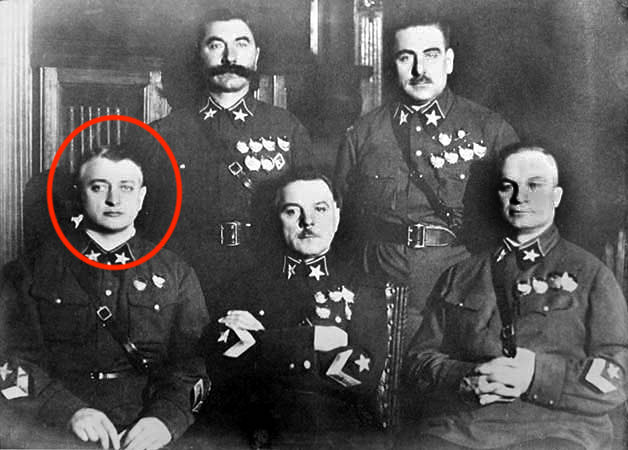
Stalin expected that Hitler might attack. But he believed that Soviet army was strong enough to repel them quickly. On paper he had much more tanks, guns, planes. So when Hitler did attack on June 22, 1941, Stalin was calm. He ordered his troops to beat them off and counterattack 
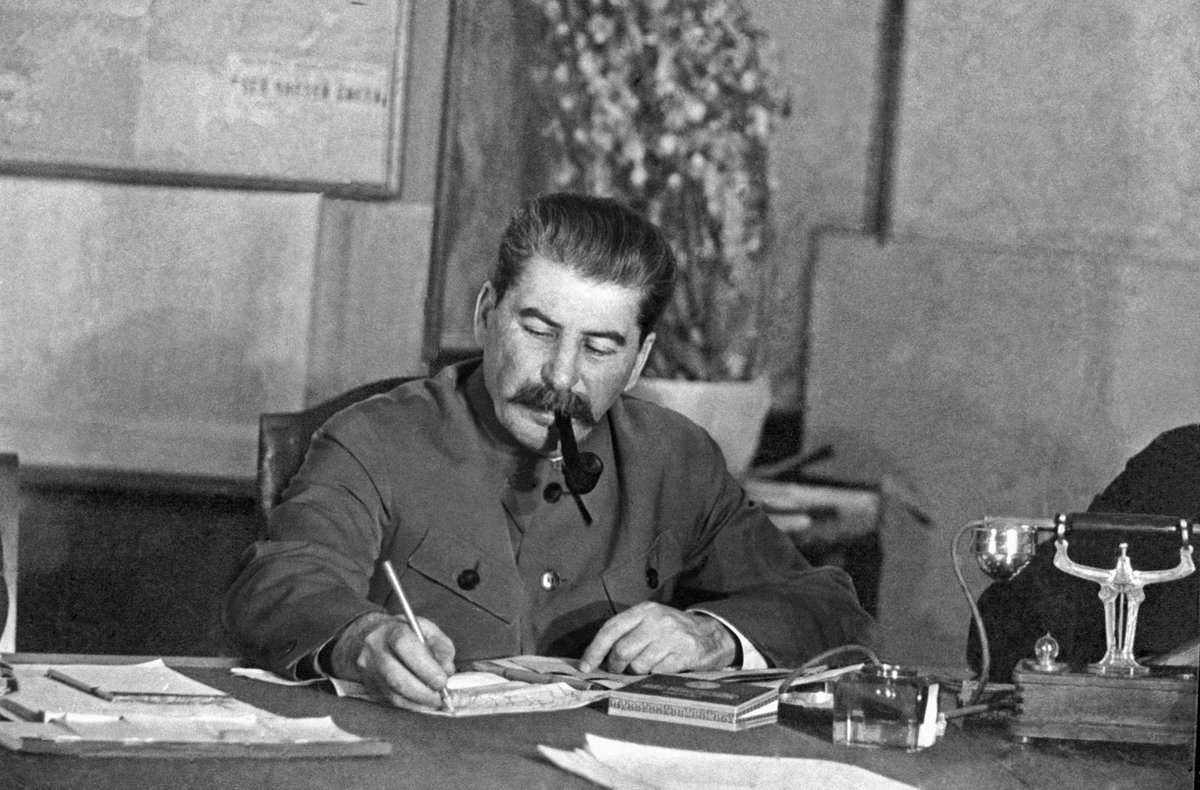
For a few days he believed the plan is working. And you know why? Nobody dared to tell him it's not. So he was calm and content, everything working perfectly. Only on June 29, a week after the war started he learnt that Minsk has fallen. That meant the road on Moscow is open 
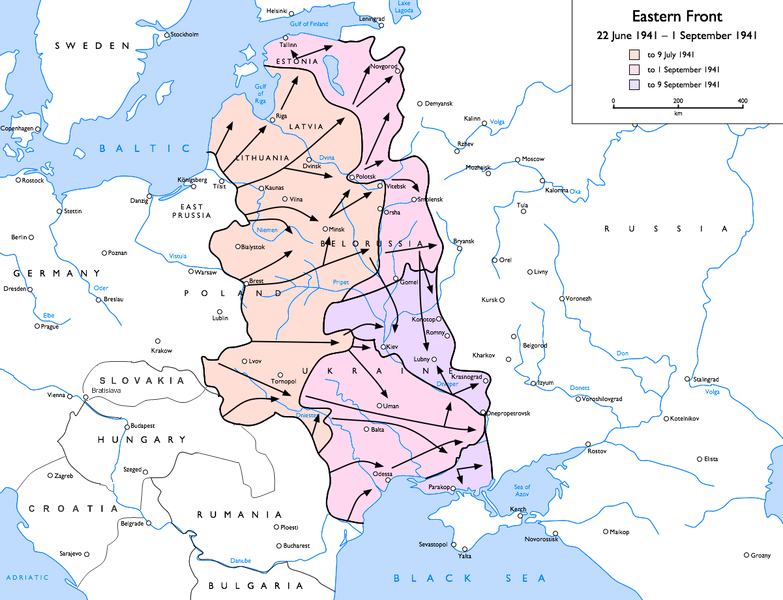
How was it possible? Minsk was covered by the strongest army USSR had, the Western Front, administered by the Belarus Military District. Stalin called the People's Commissariat (=Ministry) of Defence and asked what is the situation on the Western Front. They couldn't say anything 

Stalin was alarmed. He ordered Molotov, Malenkov, Beriya and Mikoyan to get into car and they all drove to the Comissariat. Stalin told to connect him with the Belarus Military District. Zhukov told there's no connection. And Stalin realised the Western Army doesn't exist anymore 

He yelled at Zhukov so hard, that Zhukov ran out to another room and wept. When Politburo members left the Comissariat, Stalin told:
- Lenin left us the great state and we wasted it
Ленин нам оставил великое государство, а мы его просрали
Stalin left to his dacha alone
- Lenin left us the great state and we wasted it
Ленин нам оставил великое государство, а мы его просрали
Stalin left to his dacha alone
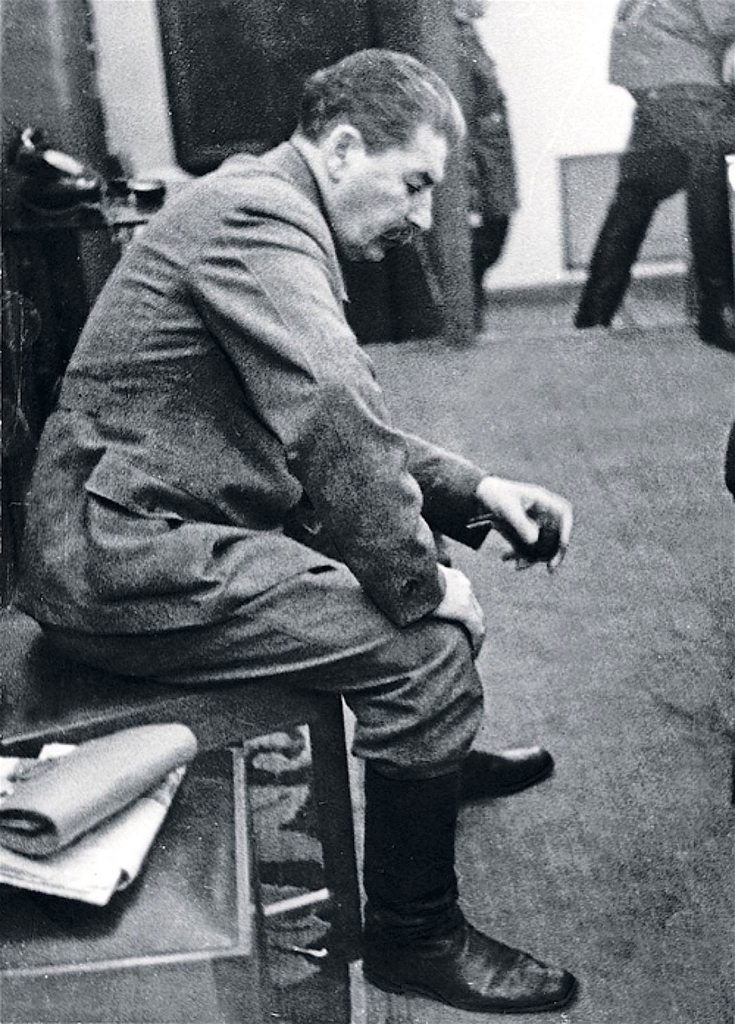
Politburo members divided. Voznesensky said that if Stalin doesn't care , then Molotov should lead the state. Molotov refused. They all went to Stalin's dacha. Stalin looked very badly and asked why did they come. Mikoyan thought - Stalin feared that they came to arrest him 
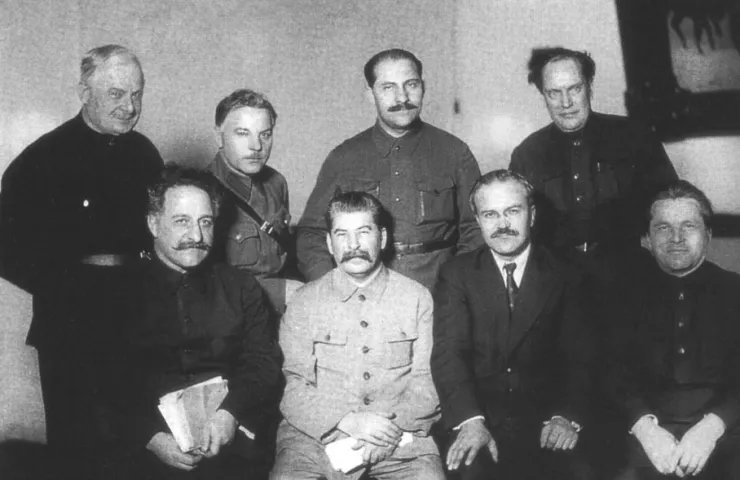
Molotov said they must form a Defence Committee to run the country. And Stalin should lead it:
- Ok - said Stalin. He looked surprised
On July 6 chief of Soviet military intelligence general-lieutenant Golikov departed to London to discuss coordination of efforts in this war
- Ok - said Stalin. He looked surprised
On July 6 chief of Soviet military intelligence general-lieutenant Golikov departed to London to discuss coordination of efforts in this war
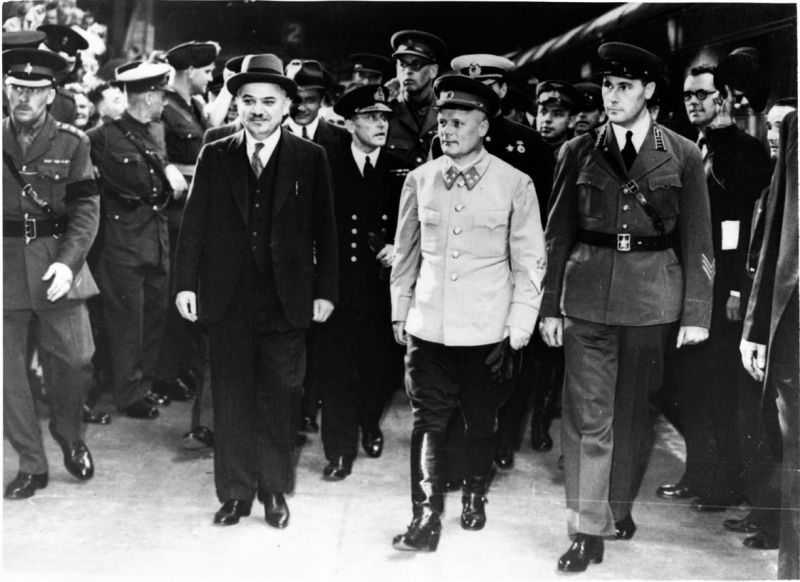
Thus the USSR allied with the US and the UK. USA organised lend lease: enormous military help in food, in fuel, in vehicles, in armament. They supplied Soviet Army for the entire war. Otherwise USSR would lose, its supply chains being disrupted by the German advance 
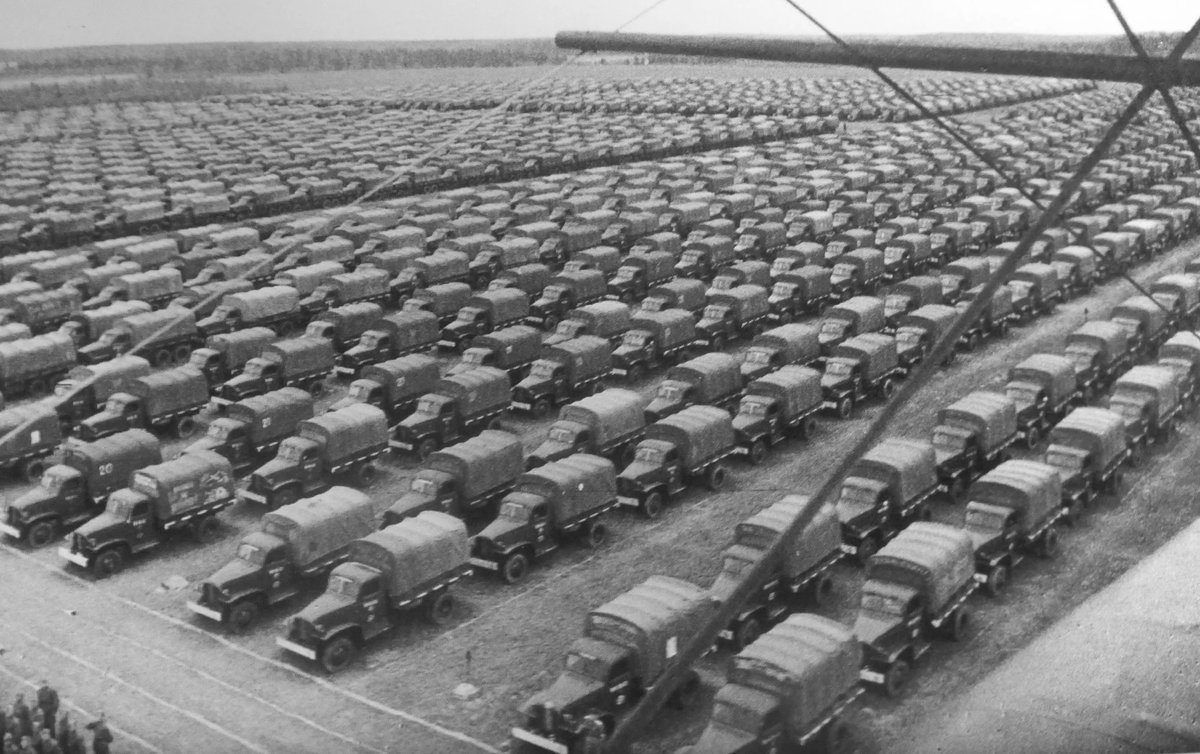
In the course of the war the narrative changed again. Now nobody would admit that the USSR wanted the war, that it built up the German military machine as an ice-breaker against the West. No, the USSR was peaceful, consistently anti-Nazi, the force of light against the darkness 
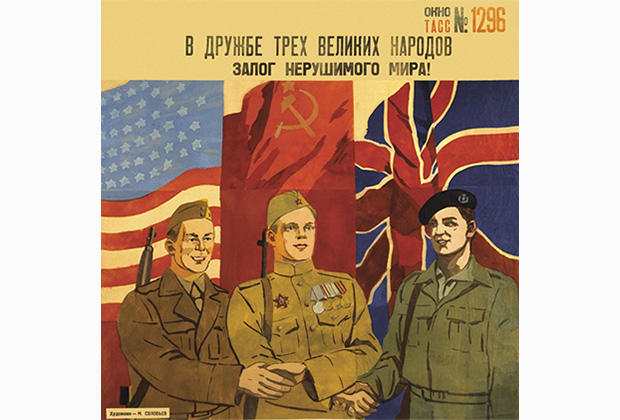
It was a lie but a convenient lie. The alliance would be diffucult if Western powers admitted the truth: that the Soviets were purposefully building up the German military machine and de facto allied with Hitler in 1939-1931 dividing Eastern Europe together. So the West bought it 
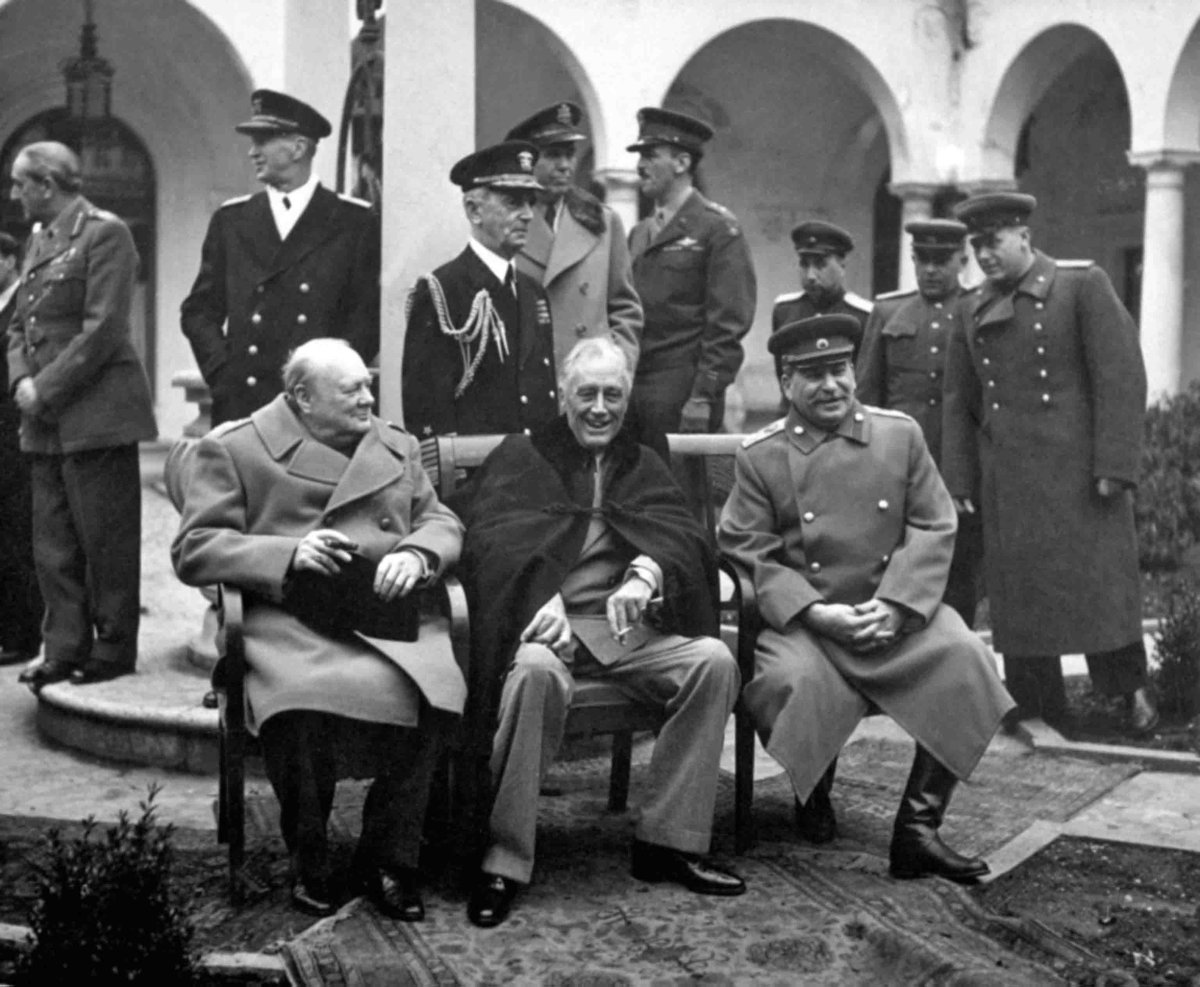
That's how a myth of the anti-Nazi USSR was borne. It was recognised by the West which didn't want to question the role of its allies in building up the Nazi military machine. After belief in Communism died, it became a legitimising myth of the Soviet state, inherited by Russia 

It didn't only legitimise every single regime in Kremlin which was saint and holy because Soviets defeated the Nazis (whose military they built up). It also became a universal tool of Russian imperialism, a weapon against any Eastern Europeans resisting the encroachment of Moscow 
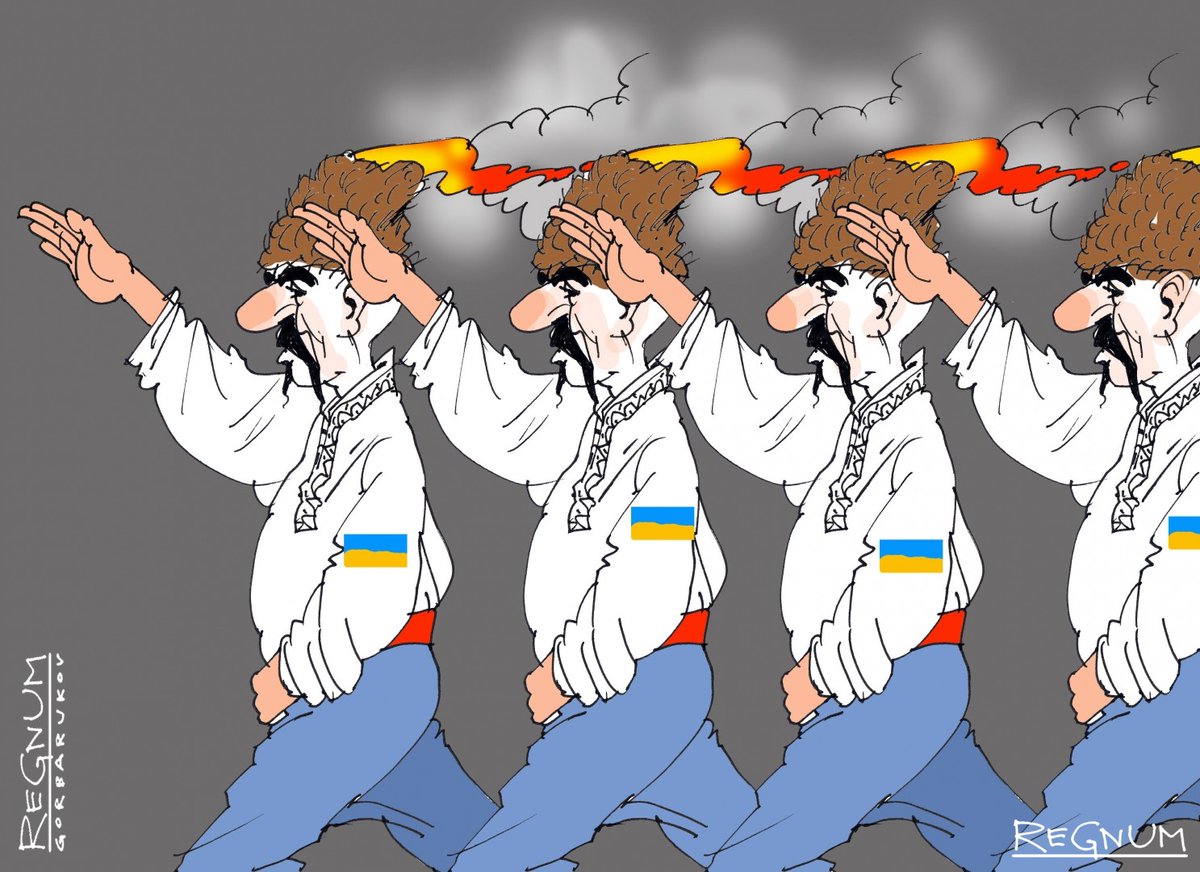
In the most extreme case it takes the form of the narrative about "traitorous ethnicities" народы-предатели. Many ethnicities were accused of collaborating with Nazis and deported en masse from their homeland to wastelands of Siberia and Kazakhstan. Mortality was enormous 
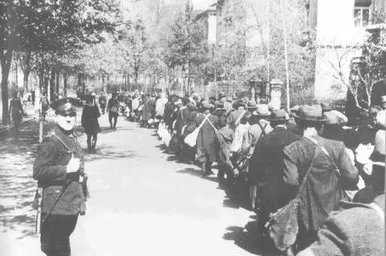
Let's examine this narrative by checking the timeline. The ethnic-based deportations and massacres started long before the war. In 1936 Ukrainian Poles were deported to Kazakstan en masse. In 1937 - Far Eastern Koreans. In 1938 - Chinese 
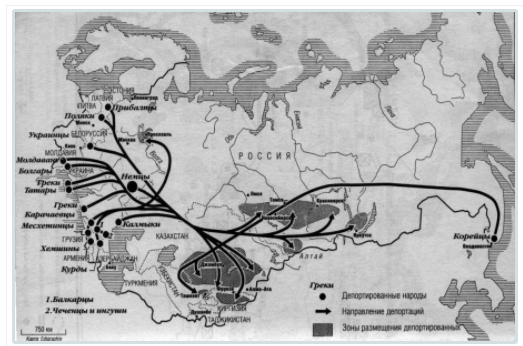
Consider the Great Purge of 1937-1938. 111 071 "spies" were executed within the Polish operation, 41 898 during the Germans one , 5439 during Romanian. Huge number of Finns, Latvians, Ingermanlands and others were included into shooting lists simply for being minorities 
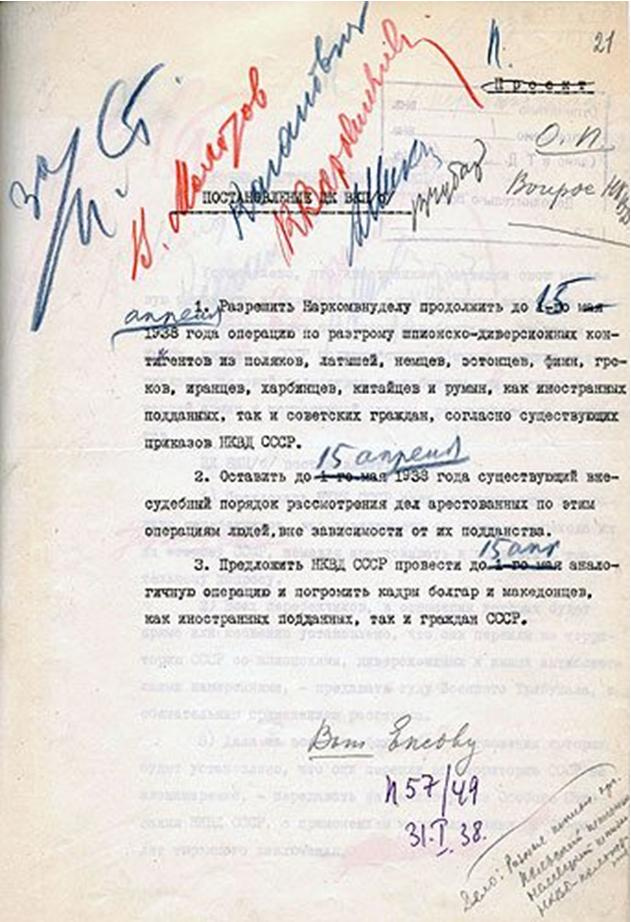
The USSR was already conducting huge ethnic cleansings before the war, before any collaboration with the Nazis could even start. The war didn't really change anything - it allowed Soviets to carry on but now with a perfect excuse. We're cleansing minorities because they're Nazi 
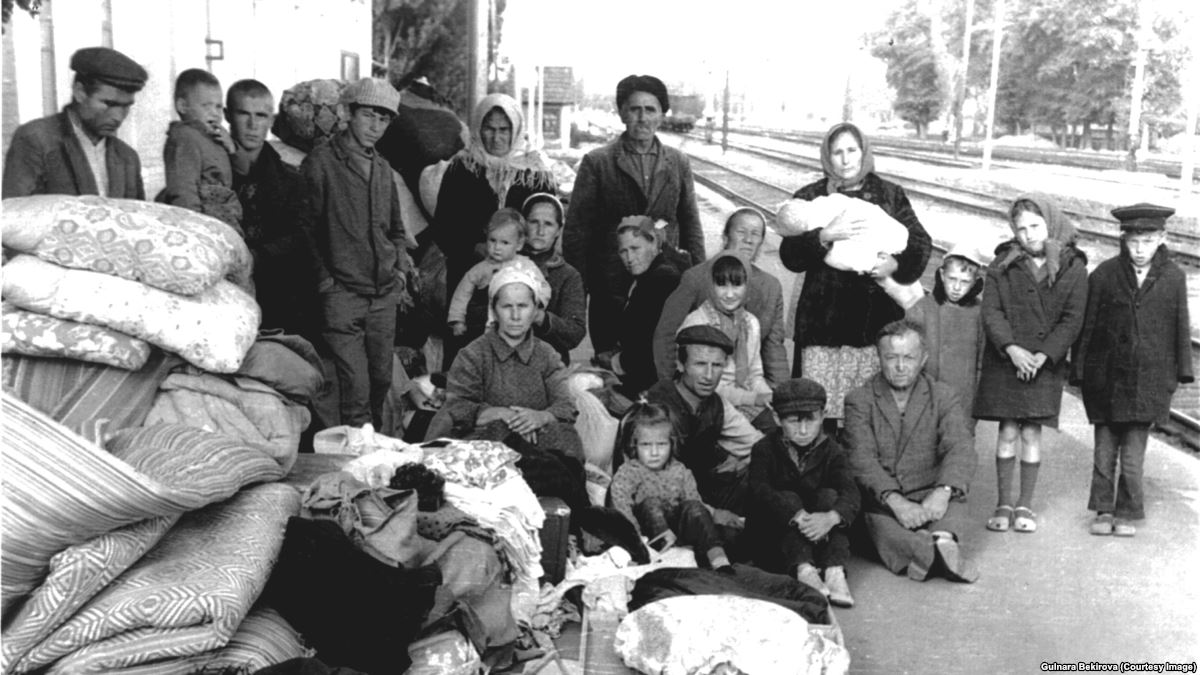
Does it mean there was no collaboration? There was, and it was massive. Stalin's regime was widely hated, and many saw the war as a chance to overthrow it. Btw ethnic Russians joined Nazis the most massively. Pro-German Russian Liberation Army had more than a million soldiers 
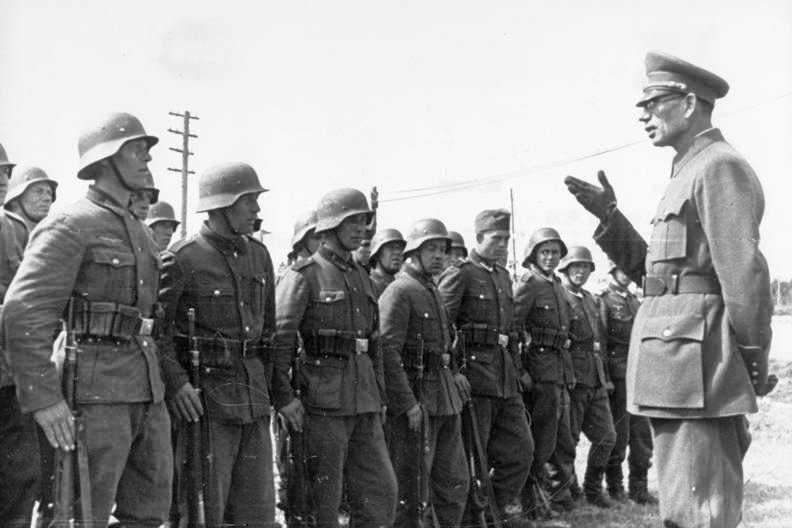
Russian Liberation army used tradition symbolics of Russian Empire, like the red-blue-white tricolour which Russia uses now. In 1945 these flags were thrown to the Red Square together with swastikas. That's why old Soviet veterans viewed new Russian flag as "Nazi", Vlasov's flag 
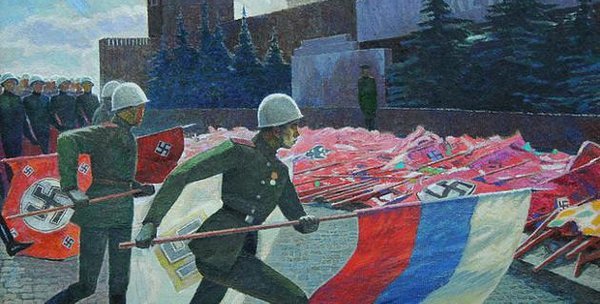
The "anti-Nazi" narrative of Russian authorities is simply a weapon against those Eastern Europeans who wouldn't submit to their will. Russia points to "pro-Nazi" symbolics in Eastern Europe. Meanwhile, according to the same logic Russia uses the Nazi flag and symbols 
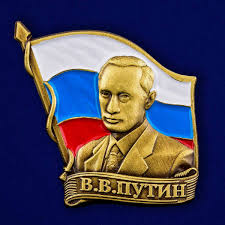
Grim truth is that Nazis found *some* support pretty much everywhere they came. In all Europe there were people who would join Naxis. Reasons varied: survival, career, revenge. Many minority nationalists, e.g. Slovak ones, felt discriminated and hoped to achieve independence 
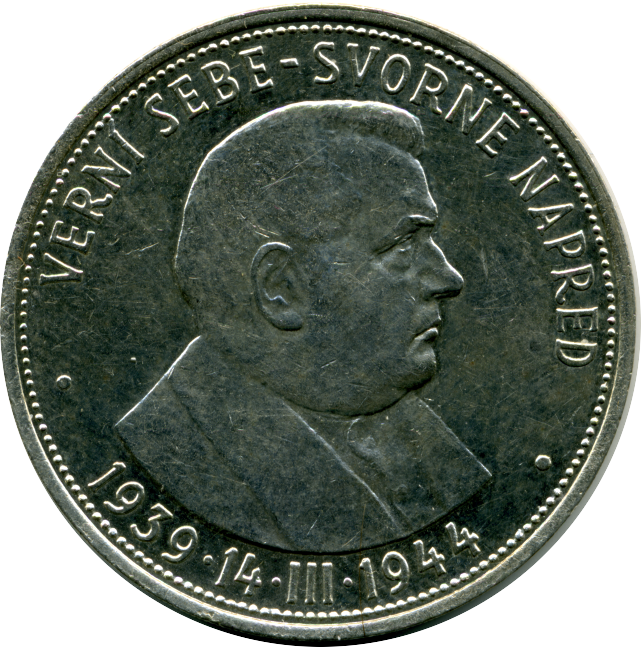
Consistent "anti-Nazi" struggle as understood by Moscow, when entire ethnicities are forever tainted and accursed because some of their members joined Nazis many decades ago, would require ethnic cleansing, well, of entire Europe. Including Russia itself 

Of course Russia wouldn't do it consistently. It would rather use it as a weapon to silence any foreign opposition to its domination. If you don't submit and surrender to Putin, that proves you are Nazi. That's some real reductio ad Hitlerum scaled up 
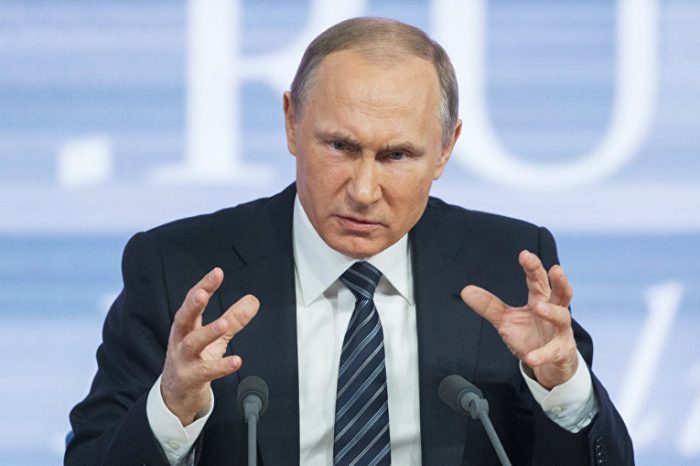
Why Russia uses it? First, because it's compatible with Russian foundation myth that rulers in Kremlin are saint because once they defeated the Nazi Germany. Ofc they won't tell that it was Kremlin that built up Nazi military might and allied with them on the early stages of WWII 
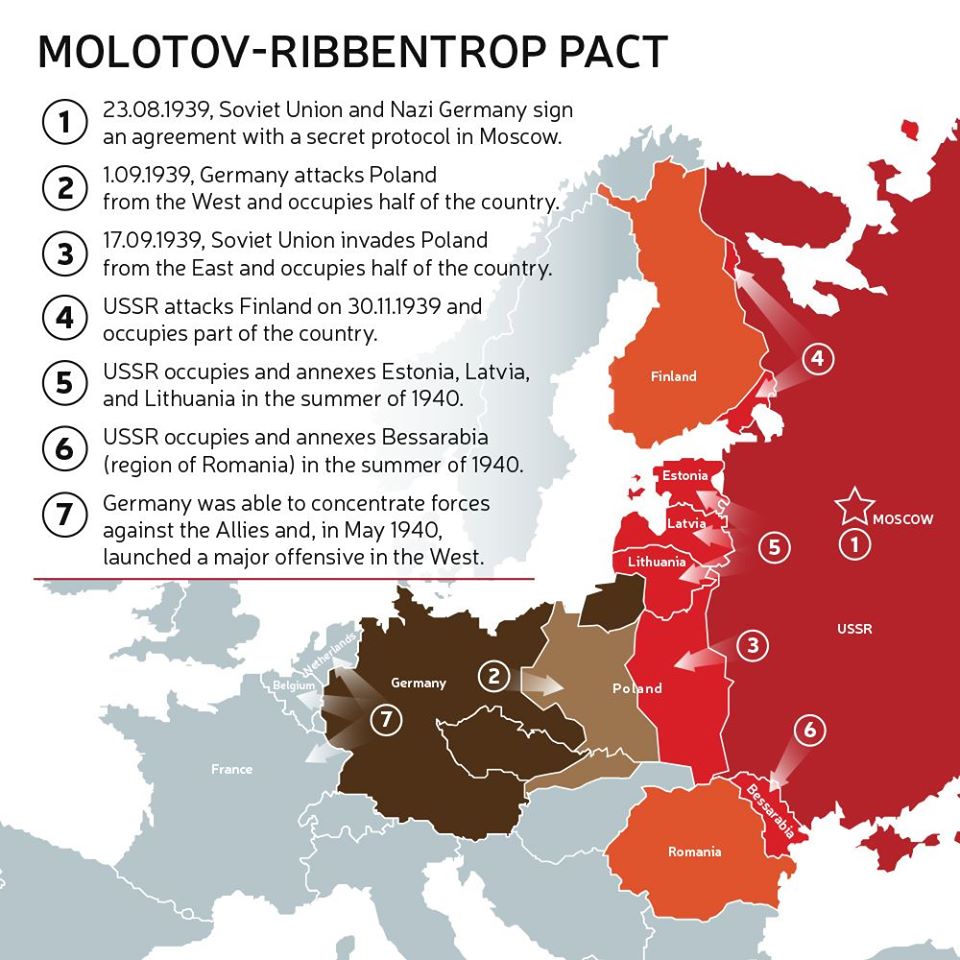
Some Russians know what BS it is. There's a joke:
- Every true patriot knows that Russian history started in 1941. And only traitors lie that it started in 1939
It reflects that WWII is a foundation myth of Russian regime and that Kremlin lies about its true role in the war
- Every true patriot knows that Russian history started in 1941. And only traitors lie that it started in 1939
It reflects that WWII is a foundation myth of Russian regime and that Kremlin lies about its true role in the war

Second reason is that the West first bought this convenient lie, in order not to question the origins of Nazi military might, and continues buying it. Persisting in feel-good-lies is emotionally easy. But it will cost a heavy price that the West is only starting to pay. End of🧵 
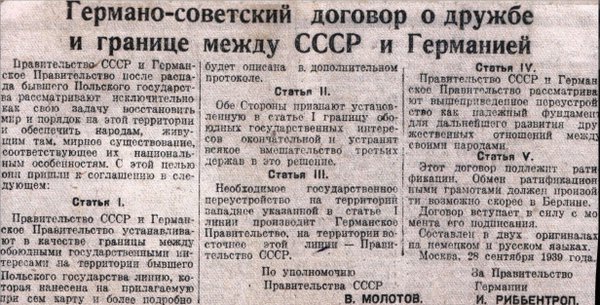
• • •
Missing some Tweet in this thread? You can try to
force a refresh







